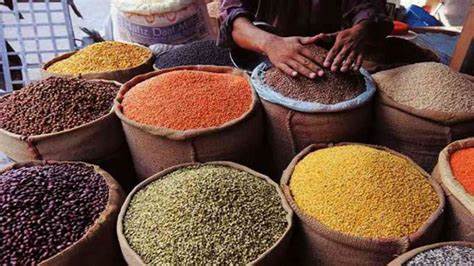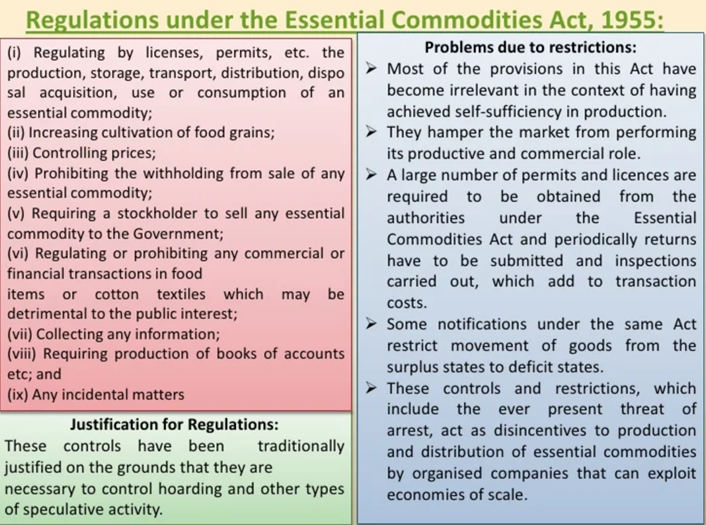
Disclaimer: Copyright infringement not intended.
Context
- With tur dal prices surging since mid-July and reports coming in of some traders creating artificial supply squeeze by restricting sales, the Centre has invoked the Essential Commodities Act of 1955 to ask States to monitor and verify the stocks available with such traders.
What is Essential Commodities Act?
- Under the EC Act of 1955, if the Central government thinks that it is necessary to maintain or increase supplies of any essential commodity or make it available at fair prices, it can regulate or prohibit the production, supply, distribution and sale of that commodity.
- Some of the essential commodities listed out in the schedule to this Act are foodstuffs including edible oils and oilseeds, drugs, fertilisers, petroleum and petroleum products. But the Centre has the power to add or remove any commodity in public interest from this list, and that’s what it has done with masks and hand sanitisers.
- In the past, the EC Act was mostly invoked to control the price rise in food products. When the prices of any of these commodities rise, the government imposes stock-holding limits to prevent hoarding, confiscates the stocks of violators and imposes punishment.
Historical Background of the Act
- The roots of this Act can be traced back to 1939 when, the Government of India made rules regarding control, production, supply, and distribution of certain specific commodities under the Defence of India Act, 1939 during World War 2. The Act ceased to exist in 1946.
- However, it was felt that certain regulations are needed urgently for the protection of some essential commodities in the interest of the general public. Therefore, The Essential Supplies (Temporary Powers) Ordinance passed in 1946, which was subsequently replaced by the Essential Supplies (Temporary Powers) Act, 1946.
- The provisions of this Act were further extended by two resolutions of the General Assembly in 1948 and 1949. After independence, by the 3rd Constitutional Amendment, the first Essential Commodities Ordinance was passed, which was subsequently replaced by the present Act namely, The Essential Commodities Act, 1955.
Object and Scope of the Act
- This Act extends to the whole of India. The Act was enacted to ensure the availability of essential commodities to consumers and protect them from the exploitation of unscrupulous traders, therefore, the Act provides rules related to the regulation and control of production, pricing, and distribution of the essential commodities.
- There are two main aims of this Act:
- To maintain or increase the supply of these essential commodities, and
- To secure equitable distribution and availability of these essential commodities.
Important Definitions
Essential Commodity
- According to the Essential Commodities Act, essential commodities mean any commodity specified in the schedule. Thus, there are 7 following commodities that are specified in the schedule:
- Drugs (this is used in the same sense as defined under clause b of Section 3 of the Drugs and Cosmetics Act, 1940);
- Fertilizers, whether organic, inorganic or mixed;
- Foodstuffs, including edible oils and its seeds;
- Hank yarn, made wholly with cotton;
- Petroleum and its products;
- Jute, whether in the form of raw or textiles;
- Seed, whether of fruits and vegetables, of cattle fodder, or of jute.
“Collector”
- According to the Act, collector means an Additional Collector or such other officer, not below the rank of the sub-divisional officer who is authorized by the Collector to perform the powers and functions of the Collector.
‘’Notified order’’
This means an order which is notified in the Official Gazette.
“Sugar”
According to the Act, the word sugar includes any form of sugar which contains more than ninety percent of sucrose, including sugar candy, khandsari sugar, bura sugar, crushed sugar, crystalize or powder sugar or the sugar whether in a form of process in a factory or raw produce.
“Foodstuff”
This term “foodstuff” is not defined anywhere under the essential commodities Act. However, the scope of this term had been developed through various cases such as:
Satpal Gupta v. State of Haryana
In this case, it was established that cattle and poultry foods are included within the meaning of the ‘foodstuff. Therefore, it concludes that the foodstuff is related to both humans and animals.
State of Bombay v. Virkumar Gulab Chand Shah AIR 1952 SC335
In this case, it was established that the foodstuff includes raw material, things used in the process and things used in the preparation of food. Therefore, turmeric has been included in the scope of foodstuff.
S.Samuel, M.D., Harrisons v. Union of India 2004 SSC 256
In this case, it was decided that tea is not a foodstuff and merely a stimulant. It neither used in the preparation of food nor contains any nutritional value, however in general parlance also when a person takes tea doesn’t consider it as having food.
Laws relating to maintenance of Essential Supplies
In order to control illegal Activities and offenses under the Essential Commodities Act,1955, the government had enacted the Prevention of Black Marketing and Maintenance of Supplies of Essential Commodities Act, in the year 1980. This Act provides powers to officers of the Central Government as well as State Government to pass the detention order against the persons who seek to control production, distribution, and supply, trade, and commerce of those essential commodities defined under Section 2 of the Essential Commodities Act,1955. The Act also contains the manner according to which these detention orders pass or execute.
Powers of Central Government Under the Essential Commodities
The Central Government under this Act have two important powers:
Power to Notify the essential commodity
Under this power, the Central Government from time to time adds and removes any commodity from the schedule for the interest of the general public. However, the commodities in regard to those such powers are exercise must have to be given under entry 33, list 111 of the 7th schedule of the constitution.
Power to issue a control order
Under this Act, the Central Government has the power to issue control orders. Such orders provide for regulation and prohibition of essential commodities scheduled in one of the following circumstances:
- When the government finds that it is necessary and expedient to do in favor of the general public.
- When they have to secure equitable distribution and availability of these commodities in the market.
- When they have to secure any specific commodity for the Defence of India.
Purposes for passing control order
To regulate by license, permit or otherwise
The central government by issuing license and permit regulates the production, distribution, supply, storage, transport, acquisition of any essential commodity. Therefore, the government issue ration/fair price shop license, importing/exporting license, etc.
To bring under cultivation of any wasteland or arable land
The Central Government by passing control order may bring any wasteland or arable land under cultivation for the purpose of growing, maintaining and increasing cultivation of any general or specific food crop.
To control the buying and selling price of any essential commodity
The Central Government may pass any control order to control the buying and selling price of any essential commodity. This type of control order can be issued:
- To Improve domestic availability;
- Keep the price at a reasonable level, and
- Regulate the artificial inflation due to hoarding and black marketing.
Example- Drug Price Control Order(DPCO-2013), Kerosene (restriction on use and fixation of ceiling price order )1994-2015
To determine entry, search, examine, seizure of any essential commodities
The Central Government by passing control order may determine entry, search, examination, seizure of:
- Any conveyance such as aircraft, vessels, vehicles used to carry essential commodity;
- Any packages, covering or receptacle in which any essential commodity are found or packed;
- Any book of account and documents which gave the information about any essential commodity.
Price Monitoring Cell (PMC)
- This is a body of individuals appointed by the Central Government, to monitor the price of essential commodities such as rice, wheat, dal, sugar, tea, potatoes, onions, milk, etc. Apart from monitoring the division, it is also responsible for predicting the future price, analyzing the price situation and giving advance feedback of these commodities which will help the policymakers in making future policies. In event of shortfall of any essential commodity, the price monitoring cell also implements commodity-specific market intervention schemes to give temporary relief to the consumers.
- At present, the price monitoring cell is monitoring the price of 22 essential commodities. For this purpose, the cell has to calculate data of all the 114 markets situated in 4 regions such as East, West. North and South of our country.

Why is the Act important?
- The ECA gives consumers protection against irrational spikes in prices of essential commodities. The Government has invoked the Act umpteen times to ensure adequate supplies. It cracks down on hoarders and black-marketeers of such commodities.
- But there is another side to the story. Given that almost all crops are seasonal, ensuring round-the-clock supply requires adequate build-up of stocks during the season. So, it may not always be possible to differentiate between genuine stock build-up and speculative hoarding. Also, there can be genuine shortages triggered by weather-related disruptions in which case prices will move up. So, if prices are always monitored, farmers may have no incentive to farm.
- With too-frequent stock limits, traders also may have no reason to invest in better storage infrastructure. Also, food processing industries need to maintain large stocks to run their operations smoothly. Stock limits curtail their operations. In such a situation, large scale private investments are unlikely to flow into food processing and cold storage facilities.

Final Thoughts
- Without the ECA the common man would be at the mercy of opportunistic traders and shopkeepers. It empowers the government to control prices directly too. The recent amendment to the Legal Metrology (Packaged Commodities) Rules 2011 is linked to the ECA.
- The Government can fix the retail price of any packaged commodity that falls under the ECA.
Bottomline
- In Mahatma Gandhi’s words, the world has enough for everyone’s need, but not everyone’s greed.
https://epaper.thehindu.com/Home/ShareArticle?OrgId=G70A54TET.1&imageview=0












